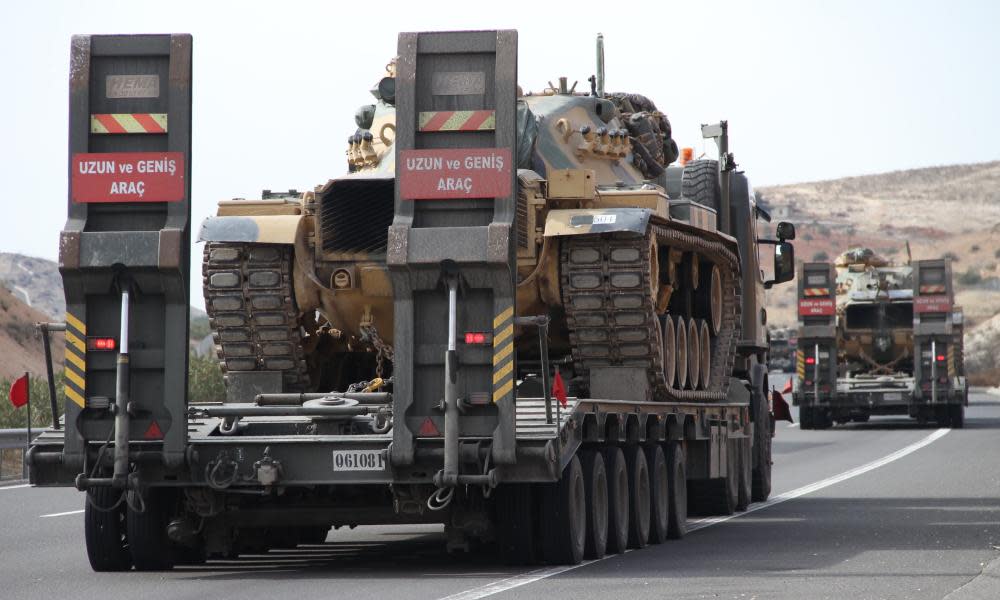Turkish attack on US-backed Kurds in Syria believed imminent

Turkish troops and tanks near the Syrian border are making final plans to attack the US military’s Kurdish partners inside northern Syria as tensions between Ankara and Washington near unprecedented levels.
Ahead of a widely expected incursion, the Turkish president, Recep Tayyip Erdoğan, threatened to “destroy all terror nests”, a reference to Kurdish forces that the US has used as proxies in the fight against Islamic State (Isis) and Turkey views as a subversive threat.
Tensions over the Kurds, which have tested relations between two nominal allies for the past three years, spiked over the weekend, when Washington announced it would raise a border force from the Kurdish-dominated Syrian Defence Force, which led the battle against Isis in north-east Syria.
Ankara views the Syrian Kurds as an extension of the Turkish Kurdish PKK, with whom it has fought a four decade insurgency inside its borders. It has vowed not to allow Kurdish groups to dominate its border with Syria.
The area most likely to be invaded by Turkish forces is a 60 mile-stretch lying between the towns of Afrin and Manbij, one of the most bitterly contested pockets of territory during the Syrian conflict. The US-raised force is proposed for north-east Syria, which Ankara is not thought to be targeting for a ground attack.
The move seems aimed to strike a symbolic wedge between the north-east and a smaller Kurdish presence along Syria’s north-west border. It would also stake a new marker for relations between Erdoğan and the Trump administration, which have steadily deteriorated over the Kurdish issue.
Erdoğan said he had not consulted Donald Trump on any planned operations.
“Last time we spoke, he said he would get back to me. He still didn’t. So I’m not planning to call him. In a short span of time, we will destroy all terror nests, one by one, in Syria, starting from Afrin and Manbij regions,” Erdoğan said. “Those who stabbed us in the back and appear to be our allies ... cannot prevent it.”
Erdoğan said it would be a joint operation involving the Turkish army and Syrian rebels backed by Ankara, and urged Nato to act to protect Turkey’s borders. The Turkish foreign minister, Mevlüt Çavuşoğlu, went further in criticism of the Trump administration, saying Washington ought to clarify “whether it chooses to be with its allies or terror groups”.
Ankara has been a prominent backer of the anti-Assad opposition since late 2011, arming rebel groups and allowing political opposition to organise.
Its involvement became more direct in mid-2016, when it sent troops to fight Isis and to establish its influence in the same area it intends to invade.
The Turkish fear then, and now, is that the Kurds have ambitions to establish a self-governing canton in north Syria along the entire border. The Syrian Kurds claim to have no links to the PKK, but they receive significant backing from the Turkish group and follow the same leader, Abdullah Öcalan, who has been jailed on an island off Istanbul for almost 20 years.
The Syrian Kurds had spearheaded a US-backed campaign to oust Isis from its self-proclaimed capital of Raqqa, a battle that finished in the autumn. Erdoğan repeatedly tried to extract a pledge from the Trump administration to halt the supply of weapons to the Kurds in the aftermath of the Raqqa campaign.
The US had vowed to ask its allies to surrender weapons once the fight against Isis had been completed. A senior Turkish official told the Guardian: “This is plainly ridiculous. It could not happen even if they wanted it to. All the serial numbers of the weapons have been erased to start with.”
Bashar al-Assad and Russia, which has backed him into a winning position on the battlefield, support Turkey’s plan, which they see as limiting US influence in the war-ravaged country.
“Afrin is not within the coalition area of operations,” said a US military spokesman, in a statement seemed designed to reassure Ankara that the proposed Kurdish border force will not creep into areas that Turkey deems to be extra sensitive.
US-backed rebels and Turkish-supported groups have fought alongside each other throughout the war, particularly in Idlib province, where Russia, Iran and Syrian troops have mounted a new offensive against the opposition in recent weeks. However, as the war has dragged on, alliances and agendas have splintered.

 Yahoo News
Yahoo News 
